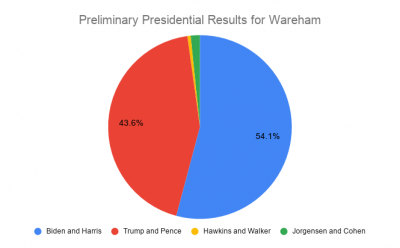In high-turnout election, Wareham voters favor Biden for president
Wareham voters favored former Vice President Joe Biden over incumbent President Donald Trump for president, and incumbent U.S. Senator Ed Markey, a Democrat, over Republican challenger Kevin O’Connor for Senate, according to preliminary results from the Town Clerk’s office.
While the majority of Wareham’s votes have been counted, it remains unclear who will emerge as the winner of the presidential race nationwide. Within Massachusetts, the results of several down-ballot races and the two ballot initiatives also have not been determined.
12,538 of Wareham’s 17,405 voters — or about 72 percent — voted early or showed up at the polls in Wareham for Tuesday Nov. 3’s presidential election, topping the town’s voter turnout numbers in presidential elections going back to 1972. It’s also noteworthy when compared to the 11,533 voters who cast ballots in the 2016 presidential election, according to the Secretary of the Commonwealth’s website.
Results are preliminary as the Town Clerk’s Office has about two weeks to certify the vote, and it is likely final totals will change. Mail-in ballots will continue to be accepted through Friday, Nov. 6, as long as they were postmarked by Election Day.
On the night of Nov. 3, there were still 398 mail-in ballots that had not yet been returned.
For the presidential race, Wareham voters backed Biden and his running mate, Senator Kamala Harris, over Republican incumbents Trump and Vice President Mike Pence. Biden and Harris received 6,733 votes (54 percent) to Trump and Pence’s 5,427 (43 percent). One percent of voters favored the Rainbow Party candidates, while two percent favored the Libertarian candidates.
In the Senate race, local voters favored Markey, who received 55 percent of the vote, over O’Connor, who received 42 percent of the vote.
Markey has been a U.S. senator for Massachusetts since 2013 and served 37 years as a U.S. representative before that, beginning in 1976. He helped author the Green New Deal, a policy proposal that would address climate change and economic inequality, and co-sponsored the 2019 Medicare for All bill, which would create a universal single-payer health care system.
Wareham voters also faced a choice between incumbent U.S. representative Bill Keating and Republican challenger Helen Brady to represent Massachusetts’ 9th Congressional District. Keating was favored by a wide margin in Wareham, winning a total of 57 percent of the vote, compared to Brady’s 38 percent of the vote.
The Massachusetts state House and Senate candidates ran unopposed.
Democratic Senator Marc Pacheco, who is the longest continuously-serving member of the legislature, received 8,895 votes in Wareham. Pacheco has been a state senator since he was elected in 1992, and represents the 1st Plymouth and Bristol District.
Republican and nine-term incumbent Susan Gifford has been a member of the House of Representatives since 2003. A total of 9,285 Wareham voters favored Gifford to continue representing the House’s 2nd Plymouth district.
Wareham voters were also asked to evaluate two ballot questions when they stepped into the voting booth or filled out their ballots at home.
A majority of voters in town supported a measure requiring automakers to grant independent auto repair shops and dealerships access to cars’ wirelessly-transmitted telematic data — also known as mechanical and diagnostic data — for vehicles sold in the state starting from model year 2022.
Supporters of Question 1 argued that more access to telematic data will allow customers more choice in repair shops. Opponents argued the new rule could make it too easy for companies and individuals to access or sell telematic data. The campaigns for and against were well-funded, but in Wareham, there were 9,008 “yes” votes and 3,013 “no” votes on Question 1. Four percent of voters left the question blank.
In contrast, a majority of Wareham voters opposed establishing a ranked-choice voting system for many future federal and statewide offices. If approved, voters would rank candidates in order of preference instead of just voting for a single candidate. If no single candidate received an initial majority, the election would go to a ranked-choice runoff until one candidate received a majority of the vote.
If the measure passes in Massachusetts, it would take effect in 2022. In Wareham, Question 2 received 3,901 “yes” votes and 7,996 “no” votes. Interestingly, 641 people, or five percent of voters, left that question blank.
As of about 9 a.m. Wednesday, Nov. 4, the results for both ballot questions in Wareham seemed to be in line with the results statewide.
Along with the fact that many results remain unknown, Election Day 2020 was also unique because of the coronavirus crisis.
Only four voters at a time were allowed inside each polling location, and all doors were kept open to maximize airflow in accordance with guidance from the state on coronavirus safety. Masks were required, but voters could not wear masks or clothing that promoted a specific candidate or candidate’s slogan inside the polling places.
There was an uptick in voter registrations ahead of the 2020 presidential election of about seven percent, according to Town Clerk Michele Bissonnette. She said presidential elections typically increase registrations and added that many younger people registered to vote before this election.











